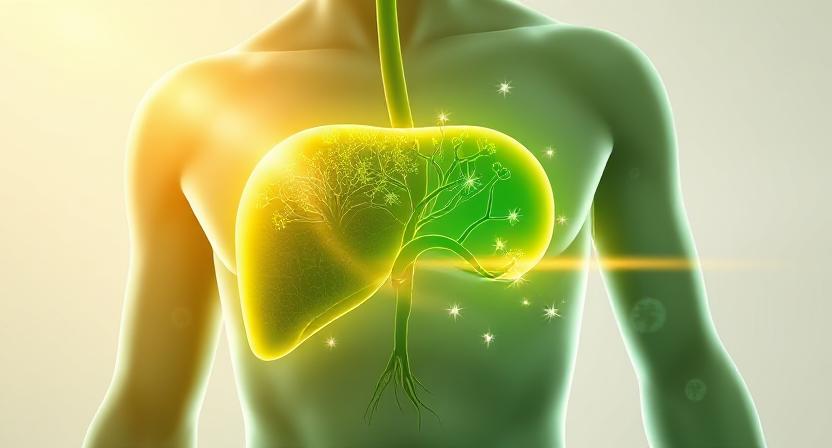

Cancer Cannot Thrive in a Healthy Liver: Understanding the Link Between Liver Function and Disease Prevention


Arya Soleil
The Liver’s Role in Defending the Body
The liver is the body’s largest internal organ and a powerhouse when it comes to detoxification, metabolism, and immune support. Everything we eat, breathe, and absorb through our skin is filtered by the liver. Its job is to neutralize harmful substances, break down hormones, support digestion, and regulate blood composition. When the liver is functioning optimally, it protects the body from an array of chronic conditions—cancer included.
Toxins and Cancer Risk: A Dangerous Connection
Many cancers are believed to stem from prolonged exposure to toxins, hormonal imbalances, and chronic inflammation. These are precisely the issues the liver is designed to handle. When the liver is overburdened or sluggish due to poor diet, alcohol, medications, or environmental toxins, its ability to remove harmful substances is impaired. This leaves the door open for abnormal cell growth and mutation—the foundation of cancer development.
Detoxification Pathways and Cellular Protection
The liver operates through two main phases of detoxification. Phase 1 neutralizes toxins with enzymes, while Phase 2 binds those toxins to make them water-soluble and easier to excrete. This process requires specific nutrients like B vitamins, magnesium, glutathione, and amino acids. When detox pathways are compromised or overloaded, toxins can recirculate in the bloodstream, damaging DNA and triggering oxidative stress—another key player in cancer.
Inflammation: Fueling Disease When the Liver Slows Down
Chronic inflammation is one of the most consistent factors linked to cancer, and the liver plays a central role in controlling it. A healthy liver regulates cytokines, produces anti-inflammatory proteins, and prevents immune system overactivation. However, when the liver is overwhelmed, inflammatory markers surge, immune function declines, and the terrain becomes ripe for cancer to take hold.
Hormonal Balance and Estrogen Dominance
The liver is also responsible for breaking down excess hormones, including estrogen. If the liver cannot do this efficiently, excess estrogen remains in circulation and can stimulate the growth of estrogen-sensitive tissues, increasing the risk of breast, uterine, and ovarian cancers. Supporting liver health can help restore hormonal balance and reduce this risk.
Signs Your Liver May Be Overworked
Fatigue, skin issues, digestive discomfort, mood swings, headaches, and persistent weight gain are just a few signs the liver may not be functioning optimally. Even without a diagnosed liver condition, suboptimal liver function can create a fertile ground for disease. Addressing liver health early is a proactive way to strengthen the body’s internal defenses.
Natural Ways to Strengthen Liver Function
Supporting your liver doesn’t require expensive cleanses. Simple daily habits can make a profound difference. Hydrate generously with clean, filtered water. Eat bitter greens like arugula and dandelion. Incorporate cruciferous vegetables such as broccoli, Brussels sprouts, and cabbage. Minimize alcohol, sugar, and processed food. Consume antioxidant-rich foods like turmeric, ginger, garlic, and beets.
The Power of Herbal Support
Several herbs have a longstanding reputation for supporting liver health. Milk thistle is rich in silymarin, which helps regenerate liver cells and reduce inflammation. Dandelion root stimulates bile flow and detoxification. Schisandra berry and artichoke leaf are also used in traditional medicine to enhance liver resilience. Integrating these herbs through teas or supplements can offer protective benefits.
The Gut-Liver Axis and Immunity
The liver works closely with the gut, filtering blood that comes from the digestive tract. When the gut is leaky or imbalanced, it sends a stream of harmful substances to the liver, increasing its burden. A healthy gut supports liver health and vice versa. Incorporating fermented foods, fiber-rich vegetables, and prebiotics can help balance gut flora and reduce liver stress.
The Emotional Connection to Liver Health
In traditional Chinese medicine, the liver is linked to emotional balance, particularly anger and frustration. Chronic stress, emotional suppression, and unresolved trauma can all burden the liver’s energetic flow. Practices like journaling, breathwork, meditation, and somatic therapy can support liver function by calming the nervous system and promoting emotional detoxification.
Functional Testing for Liver Health
If you suspect liver dysfunction, there are functional tests that go beyond basic liver enzymes. These include tests for liver detox pathways, oxidative stress markers, and hormone clearance. Working with a functional medicine practitioner can help assess your liver’s performance and create a personalized support plan.
Cancer Prevention Starts with the Liver
The idea that cancer cannot take hold in a well-functioning liver underscores the importance of preventative health. While no organ works in isolation, the liver’s unique role in cleansing the blood, metabolizing hormones, reducing inflammation, and supporting immune function gives it outsized influence over whether cancer cells are eliminated or allowed to proliferate.
Conclusion: Nourish Your Liver, Defend Your Health
A resilient liver is one of the body’s greatest allies in the fight against cancer. By prioritizing liver health through diet, detoxification, stress reduction, and herbal support, you create an internal environment that is inhospitable to disease. The body has an incredible ability to heal when given the right tools—and it all begins with the liver. Whether you’re aiming to prevent illness or support recovery, turning your focus to liver wellness is a profound act of self-care.
Recommended Reads

- June 9, 2025
Castor Oil in the Navel: A Forgotten Practice That Supports Digestion and Sleep
Home News Healthy Habits & Lifestyle Health Conditions &...


- June 9, 2025
Turmeric for Ulcers: A Natural Way to Soothe and Protect Your Stomach
Home News Healthy Habits & Lifestyle Health Conditions &...


- June 9, 2025
The Healing Power of Castor Oil Compresses: A Natural Therapy for Detox, Sleep, and Circulation
Home News Healthy Habits & Lifestyle Health Conditions &...


- June 9, 2025
Medicinal Mushrooms: Ancient Remedies with Modern Benefits
Home News Healthy Habits & Lifestyle Health Conditions &...


- June 9, 2025
Triphala: The Ancient Herbal Blend That Supports Digestion, Detox, and Longevity
Home News Healthy Habits & Lifestyle Health Conditions &...


- June 9, 2025
Mullein: Herbal Support for Lung Health and Clear Breathing
Home News Healthy Habits & Lifestyle Health Conditions &...

Cancer Cannot Thrive in a Healthy Liver: Understanding the Link Between Liver Function and Disease Prevention

The Liver’s Role in Defending the Body
The liver is the body’s largest internal organ and a powerhouse when it comes to detoxification, metabolism, and immune support. Everything we eat, breathe, and absorb through our skin is filtered by the liver. Its job is to neutralize harmful substances, break down hormones, support digestion, and regulate blood composition. When the liver is functioning optimally, it protects the body from an array of chronic conditions—cancer included.
Toxins and Cancer Risk: A Dangerous Connection
Many cancers are believed to stem from prolonged exposure to toxins, hormonal imbalances, and chronic inflammation. These are precisely the issues the liver is designed to handle. When the liver is overburdened or sluggish due to poor diet, alcohol, medications, or environmental toxins, its ability to remove harmful substances is impaired. This leaves the door open for abnormal cell growth and mutation—the foundation of cancer development.
Detoxification Pathways and Cellular Protection
The liver operates through two main phases of detoxification. Phase 1 neutralizes toxins with enzymes, while Phase 2 binds those toxins to make them water-soluble and easier to excrete. This process requires specific nutrients like B vitamins, magnesium, glutathione, and amino acids. When detox pathways are compromised or overloaded, toxins can recirculate in the bloodstream, damaging DNA and triggering oxidative stress—another key player in cancer.
Inflammation: Fueling Disease When the Liver Slows Down
Chronic inflammation is one of the most consistent factors linked to cancer, and the liver plays a central role in controlling it. A healthy liver regulates cytokines, produces anti-inflammatory proteins, and prevents immune system overactivation. However, when the liver is overwhelmed, inflammatory markers surge, immune function declines, and the terrain becomes ripe for cancer to take hold.
Hormonal Balance and Estrogen Dominance
The liver is also responsible for breaking down excess hormones, including estrogen. If the liver cannot do this efficiently, excess estrogen remains in circulation and can stimulate the growth of estrogen-sensitive tissues, increasing the risk of breast, uterine, and ovarian cancers. Supporting liver health can help restore hormonal balance and reduce this risk.
Signs Your Liver May Be Overworked
Fatigue, skin issues, digestive discomfort, mood swings, headaches, and persistent weight gain are just a few signs the liver may not be functioning optimally. Even without a diagnosed liver condition, suboptimal liver function can create a fertile ground for disease. Addressing liver health early is a proactive way to strengthen the body’s internal defenses.
Natural Ways to Strengthen Liver Function
Supporting your liver doesn’t require expensive cleanses. Simple daily habits can make a profound difference. Hydrate generously with clean, filtered water. Eat bitter greens like arugula and dandelion. Incorporate cruciferous vegetables such as broccoli, Brussels sprouts, and cabbage. Minimize alcohol, sugar, and processed food. Consume antioxidant-rich foods like turmeric, ginger, garlic, and beets.
The Power of Herbal Support
Several herbs have a longstanding reputation for supporting liver health. Milk thistle is rich in silymarin, which helps regenerate liver cells and reduce inflammation. Dandelion root stimulates bile flow and detoxification. Schisandra berry and artichoke leaf are also used in traditional medicine to enhance liver resilience. Integrating these herbs through teas or supplements can offer protective benefits.
The Gut-Liver Axis and Immunity
The liver works closely with the gut, filtering blood that comes from the digestive tract. When the gut is leaky or imbalanced, it sends a stream of harmful substances to the liver, increasing its burden. A healthy gut supports liver health and vice versa. Incorporating fermented foods, fiber-rich vegetables, and prebiotics can help balance gut flora and reduce liver stress.
The Emotional Connection to Liver Health
In traditional Chinese medicine, the liver is linked to emotional balance, particularly anger and frustration. Chronic stress, emotional suppression, and unresolved trauma can all burden the liver’s energetic flow. Practices like journaling, breathwork, meditation, and somatic therapy can support liver function by calming the nervous system and promoting emotional detoxification.
Functional Testing for Liver Health
If you suspect liver dysfunction, there are functional tests that go beyond basic liver enzymes. These include tests for liver detox pathways, oxidative stress markers, and hormone clearance. Working with a functional medicine practitioner can help assess your liver’s performance and create a personalized support plan.
Cancer Prevention Starts with the Liver
The idea that cancer cannot take hold in a well-functioning liver underscores the importance of preventative health. While no organ works in isolation, the liver’s unique role in cleansing the blood, metabolizing hormones, reducing inflammation, and supporting immune function gives it outsized influence over whether cancer cells are eliminated or allowed to proliferate.
Conclusion: Nourish Your Liver, Defend Your Health
A resilient liver is one of the body’s greatest allies in the fight against cancer. By prioritizing liver health through diet, detoxification, stress reduction, and herbal support, you create an internal environment that is inhospitable to disease. The body has an incredible ability to heal when given the right tools—and it all begins with the liver. Whether you’re aiming to prevent illness or support recovery, turning your focus to liver wellness is a profound act of self-care.
Recommended Reads

- June 9, 2025
Castor Oil in the Navel: A Forgotten Practice That Supports Digestion and Sleep
Home News Healthy Habits & Lifestyle Health Conditions &...


- June 9, 2025
Turmeric for Ulcers: A Natural Way to Soothe and Protect Your Stomach
Home News Healthy Habits & Lifestyle Health Conditions &...


- June 9, 2025
The Healing Power of Castor Oil Compresses: A Natural Therapy for Detox, Sleep, and Circulation
Home News Healthy Habits & Lifestyle Health Conditions &...


- June 9, 2025
Medicinal Mushrooms: Ancient Remedies with Modern Benefits
Home News Healthy Habits & Lifestyle Health Conditions &...


- June 9, 2025
Triphala: The Ancient Herbal Blend That Supports Digestion, Detox, and Longevity
Home News Healthy Habits & Lifestyle Health Conditions &...


- June 9, 2025
Mullein: Herbal Support for Lung Health and Clear Breathing
Home News Healthy Habits & Lifestyle Health Conditions &...



